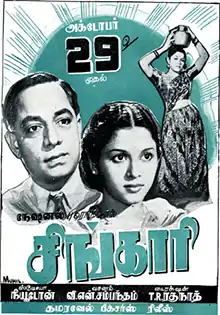| Singari | |
|---|---|
 Theatrical release poster | |
| Directed by | T. R. Raghunath |
| Screenplay by | T. R. Raghunath |
| Story by | V. S. Venkatachalam |
| Starring | T. R. Ramachandran Lalitha Padmini |
| Cinematography | P. S. Selvaraj[1] |
| Edited by | S. A. Murugesan[1] |
| Music by | S. V. Venkatraman T. R. Ramanathan T. A. Kalyanam |
Production company | National Productions |
| Distributed by | Kumaravel Pictures[2] |
Release date |
|
| Country | India |
| Language | Tamil |
Singari is a 1951 Indian Tamil language comedy film directed by T. R. Raghunath.[1] The film stars T. R. Ramachandran, Lalitha and Padmini.[3] It was released on 29 October 1951.[1]
Plot
A young man (Nayagam) who is wrongly convicted for a bank robbery leaves his young daughter behind to serve a seven-year sentence in prison. She is involved in a car accident. The car owner, a rich man, (Balasubramaniam) brings her up as his own, changing her name (Padmini). A college-going girl (Lalitha) drawn to the world of entertainment runs away from home and joins a drama troupe run by TRR assisted by a crooked manager (T. K. Ramachandran). Sahasranamam (the rich man's son) is thrown out of the house by his father because of his insistence on going abroad for further studies. The father goes on a long pilgrimage and Sahasranamam coming back meets Padmini who is drawn to him. However, he goes around with the stage actor (Lalitha), creating much gossip. Indeed T. R. Ramachandran is in love with her. Complications ensue and, in the end, it turns out that the young women are the daughters of two brothers and the two couples marry and live happily.[3]
Cast
Adapted from the opening credits of the film
|
|
Soundtrack
Music was composed by 3 music directors – T. A. Kalyanam, S. V. Venkatraman and T. R. Ramanathan while the lyrics were penned by Thanjai N. Ramaiah Dass, K. P. Kamatchi Sundaram and Kannadasan.[3] Probably T. R. Ramanathan handled the background music as his name does not appear in the credits for songs.
Songs
The following list of songs is adapted from the book authored by K. Neelamegam.[4]
| Song | Singer/s | Lyricist | Composer | Duration (m:ss) |
|---|---|---|---|---|
| "Sudhdham Seyyanum" | Jikki | Kannadasan | T. A. Kalyanam | 02:58 |
| "Paalu Paalu Pasum Paalu" | P. A. Periyanayaki & P. Leela | Thanjai Ramaiah Dass | 04:27 | |
| "Kani Suvai Tharum Amudhaave" | Thiruchi Loganathan & Jikki | |||
| "Ezhaigal Vaazhave Idamillaiyaa" | Thiruchi Loganathan | |||
| "Maaname Pradhaaname" | Thiruchi Loganathan | 02:49 | ||
| "Oru Jaan Vayire Illaattaa" | K. N. Reddy, K. Rani | S. V. Venkatraman | 03:56 | |
| "Jighu Jighu Samakku Paarungo" | P. Leela | 01:56 | ||
| "O! Chellaiah Nee Vallaiah" | P. Leela | |||
| "Urum Sadhamalla Uttrarum" | C. S. Pandian | |||
| "Kaanil Vennilaa Poleh" | P. Leela | 02:34 | ||
| "Kohnaadha Marathinile" | K. H. Reddy, K. Rani | 01:10 | ||
| "Bhaarathi Enge Solladi" | P. Leela | |||
| "Ottai Pallai Kaatiye" | ||||
| "Vaanavillaipoleh Oru Vaaliban" | P. Leela | K. P. Kamatchi Sundaram | 02:56 |
Reception
Film historian Randor Guy wrote in 2011 that the film was remembered for its storyline, music, song, dances and the remarkable performance of artistes like Sahasranamam, Lalitha, Padmini, D. Balasubramaniam and Kaka Radhakrishnan.[3]
Legacy
Comedian K. A. Thangavelu came to be known as Danaal Thangavelu because he used the phrase Danaal Danaal in his dialogues in this film.[4]
References
- 1 2 3 4 "1951 – சிங்காரி – நேஷனல் புரொடக்ஷன்ஸ்" [1951 – Singari – National Productions]. Lakshman Sruthi (in Tamil). Archived from the original on 28 January 2017. Retrieved 28 January 2017.
- ↑ "சிங்காரி". Deepavali Malar (in Tamil). Kalki. 1 July 1951. p. 207. Retrieved 11 October 2022.
- 1 2 3 4 Guy, Randor (20 August 2011). "Singari 1951". The Hindu. Archived from the original on 20 December 2013. Retrieved 28 January 2017.
- 1 2 Neelamegam, K. (2014). Thiraikalanjiyam – Part 1 (in Tamil) (1st ed.). Chennai: Manivasagar Publishers. pp. 18–19.